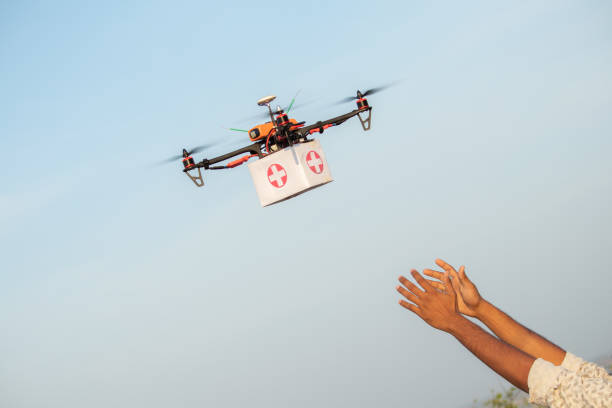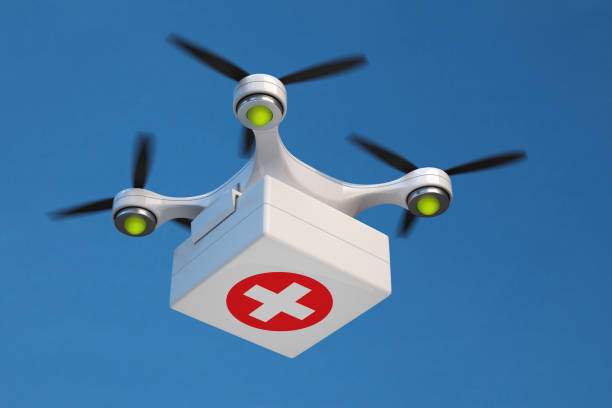The drone technology which has integration with the healthcare system is a groundbreaking development. These are the reshaping of the way medical services are delivered. Today scenario drones have been highly increased drone can be used to improve efficiency, accessibility, and speed in healthcare delivery, particularly in remote areas or underserved areas. This blog explores the various ways drones are influencing the healthcare system.
The Rise of Drones in Healthcare

Drones have been increased significantly within the initial uses of military and recreational settings. This is a valuable tool for various sectors, with health. The COVID-19 pandemic can be accelerated with the adoption of drone technology. This can show the potential of delivering medical supplies and vaccines by conducting telehealth services.
The Benefits of Drones in Healthcare
Drones can be used for transporting medical emergencies like vaccines, medications, and blood products that can provide data more quickly than traditional ground transportation techniques. The drone speed is most important for emergencies that can make it can deliver in time for saving life.
Drones must execute tasks in rural areas that can make for more accessibility due to poor infrastructure. You have to ensure that individual regions. They a makes collect necessary medical supplies and services with bridging the health gap.
Drone can be used for decreasing human content during deliveries. This can make for reducing the risk of infection spread, Drones can be made to decrease human contact during deliveries. They can reduce the risk of infection spread, which is important when during health crises like the COVID-19 pandemic.
When you have to use a drone to collect data. Drone can have to save their cost on the transportation and logistics. This is mainly for short-distance deliveries in unreachable locations.
Drones can provide important tools medical that are faster than traditional methods.
Applications of Drones in Healthcare

The applications of drones in healthcare are diverse and continue to expand. Here are some notable uses:
The drones have been used to deliver vaccines and supply medical in various countries including Rwanda. The zipline operator can provide successful drone delivery services for blood products.
Drones are capable of transporting organs quickly and safely, ensuring they arrive at their destination in optimal condition.
The drone can collect patient comprise and transfer into drones. They can be transported to laboratories, the stimming, and the testing process.
Drones are ready with the communication technology that can make for facilitating remote consultation. It can connect healthcare providers with the patient in isolated areas.
Drones have been prepared with imaging technologies that can monitor disease outbreaks and collect valuable data for timely medical interventions.
Challenges Facing by Using Drone Integration in Healthcare

Using a drone can face many challenges in the healthcare system:
The regulation of the landscape for drone operations is still evolving. There is compliance with the aviation regulation which is necessary to permit the significant barrier.
The drone operator must ensure the safety of drone flight and privacy concerns. These can be related to the surveillance capabilities which are critical issues that need to be managed.
Drone technology has limitations, such as battery life and payload capacity. The operator must also be able to fly the drone in adverse weather conditions.
There is a need to build trust and acceptance in local communities. This can be important for every successful implementation of drone services in healthcare.
The Future of Drones in Healthcare
The future of drones in healthcare looks promising, with ongoing advancements in technology and increasing investment in drone infrastructure. As regulations adapt to accommodate drone operations, we can expect to see:
The drone operator has to build partnerships between healthcare providers, drone manufacturers, and regulatory bodies which is very necessary for expanding drone services.
The future of drones can be incorporated with an advanced feature like artificial intelligence that can navigate and improve payload capabilities.
The drone can assist with disaster response, disease surveillance, and healthcare routine logistics that can have to grow continuously.
Conclusion
Drones have to play an important role in the healthcare system. This can make for improving the delivery of services to care. The technology can continue to grow with their regulatory framework. The combination of drones which have to collect data with new solutions doe longstanding challenges in these industries.
Companies like Upload Enterprise can provide breathtaking footage for potential clients. Upload enterprise which has years of experience in drone photography and videography services in Sydney. We have to explore your business with the healthcare application of drones.
In the market, the drone has an innovative technology. The healthcare has been more efficient, responsive, and equitable. By using this innovative technology, the healthcare system will be more efficient, responsive, and equitable. It can be provided and ultimately lead to better health outcomes for all. They can make for ultimately lead to better health outcomes for all.
